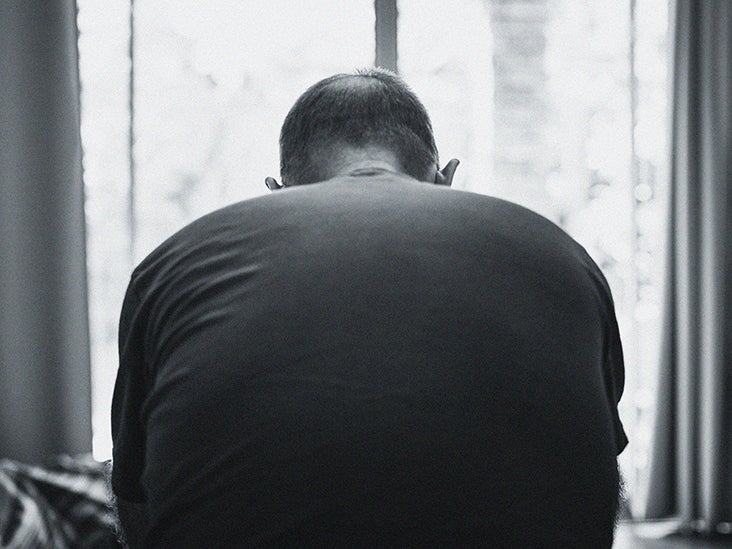
- A new study finds that depression and anxiety contribute to increased drinking during the pandemic.
- The effect is most pronounced for those over the age of 40 years.
- Among older people, those with depression and anxiety are more than twice as likely to drink more alcohol.
Previous research has found that people turn to alcohol as a means of helping them handle stress, such as in the period following the 2001 World Trade Center terrorist attacks.
The COVID-19 pandemic is no exception. Numerous studies have found that alcohol consumption has increased during the pandemic, and dramatically so for people with depression.
A new study takes a fresh look at drinking during the pandemic and finds, for the first time, that age affects the likelihood of a person consuming more alcohol as a response to the pandemic.
Lead author Ariadna Capasso, of NYU School of Global Public Health in New York City, says:
“This increase in drinking, particularly among people with anxiety and depression, is consistent with concerns that the pandemic may be triggering an epidemic of problematic alcohol use.”
The study features in the journal Preventive Medicine.
The researchers surveyed 5,850 adults from all 50 states through Facebook and its associated platforms during the months of March and April 2020. They asked the participants to describe themselves demographically and report how their alcohol use had changed since the start of the pandemic.
The survey also included questions that allowed the researchers to identify and measure the participants’ symptoms of depression and anxiety. Each person also reported the degree to which they felt at risk of SARS-CoV-2 infection.
Of all the participants identifying themselves as drinkers, 29% reported that their alcohol consumption had increased during the pandemic.
Of the drinkers, 51.2% said that the pandemic had not affected the amount of alcohol that they consumed, while another 19.8% reported drinking less.
Of all the people surveyed, 47% and 30% reported symptoms of anxiety and depression, respectively.
Individuals reporting symptoms of depression were 64% more likely to be consuming greater amounts of alcohol, while anxiety was associated with a 41% higher likelihood of increased drinking.
The study also found that demographic factors affected alcohol consumption during the pandemic:
- Women were more likely (33% as opposed to 24%) to have increased their drinking than men.
- Highly educated people were more likely to have started drinking more (32%) than those without a bachelor’s degree (25%).
- Fewer retirees (20%) reported drinking more than employed and currently unemployed participants, 31% of whom were consuming more alcohol.
- People living in rural areas were less likely to have upped their alcohol intake (25%) compared with those living in suburban and urban areas (31%).
People under the age of 40 years were the age group most likely to be drinking more in response to the pandemic. In this group, 40% said that they had increased their alcohol intake.
Of the people aged 40–59 years, 30% reported drinking more. For individuals aged 60 years and older, just 20% said that they were drinking more, except for those who were experiencing symptoms of depression and anxiety.
People aged 40 years and older with depression and anxiety were almost twice as likely to have increased their consumption of alcohol during the pandemic as others in their age group.
“We expected that younger people and those with mental health issues would report drinking as a coping mechanism, but this is the first time we’re learning that mental health is associated with differences in alcohol use by age.”
– Study co-author Yesim Tozan
One of the obvious effects of the COVID-19 pandemic is that people worry about contracting the SARS-CoV-2 virus.
The researchers separated these concerns from worries about developing a severe case of COVID-19. They found that individuals who considered themselves at a higher risk of acquiring the disease were most likely to have increased their intake of alcohol.
Interestingly, individuals who drank more saw themselves as being at a higher risk of infection but less likely to get severely sick.
Their research has led the study authors to advocate for more proactive outreach to people struggling with mental health issues during the pandemic, using telehealth to make lockdown care possible. They also suggest that health services consider more consciously targeting their messaging to specific age groups.
According to Ralph DiClemente, chair of the Department of Social and Behavioral Sciences at NYU School of Global Public Health, and the study’s senior author:
“Lessons we’ve learned from previous disasters show us that intervening early for unhealthy substance use is critical and could help lessen the pandemic’s impact on mental health.”
For live updates on the latest developments regarding the novel coronavirus and COVID-19, click here.
"consumption" - Google News
January 29, 2021 at 10:56PM
https://ift.tt/2YqSvH4
Depression, anxiety spur pandemic alcohol consumption - Medical News Today
"consumption" - Google News
https://ift.tt/2WkKCBC
https://ift.tt/2YCP29R
Bagikan Berita Ini














0 Response to "Depression, anxiety spur pandemic alcohol consumption - Medical News Today"
Post a Comment